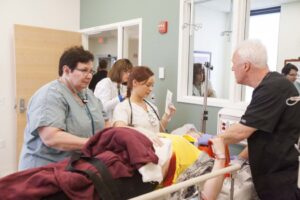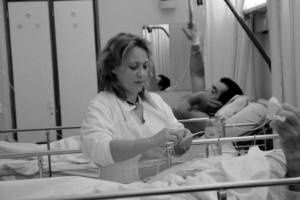Health care professionals often take much more time off work in the treatment of their addiction than other professionals. This is because of the particular intellectual challenges of the profession, as well as the dangers awaiting health professionals in the workplace (i.e. access to pharmaceuticals).
Considering a Return to Work
When is a doctor/nurse/pharmacist/veterinarian/etc… ready to return to work? My addictionist’s favourite saying is that health professionals have often returned to work too soon but none have returned too late.
By the time the return-to-work issue comes up, the health care professional should have an addictionist, a sponsor and he/she should be in a group of health professionals in Recovery, all of whom can help determine when it is safe to return to work.
The addict/alcoholic health professional in Recovery should have a solid program, regular meetings, a sponsor, a network of recovering contacts (and, preferably, also friends in Recovery). This should be firmly established and in place for several months before contemplating a return to work. Ask questions such as: will a return to work seriously diminish or impair this program of Recovery? If so, the recovering addict/alcoholic should be challenged by others in the Health Professional Recovery Group to re-evaluate his or her priorities: Recovery has to come first!
The return to work should only be considered once the recovering health professional has settled into a new life outside of work. A new personal identity should be forming, not one determined by the titles Nurse/Doctor/Pharmacist/etc…, but one defined by his/her inherent worth as a human being who is recovering from a serious life-threatening illness. Most health professionals in early Recovery can’t wait to get back to work. However, once they have started to immerse themselves in the program and have acquired several months of abstinence and Recovery, (the two are not synonymous), they start enjoying their life outside of work. Only at this stage should a return to work be contemplated.
Drugs and alcohol seriously impair cognitive abilities. It may take months, or even more than a year, to regain some cognitive functions. Can the recovering health professional multitask? Can he/she concentrate? How is his/her immediate and short-term memory? Can the health professional follow a series of instructions or tasks or directions accurately? Orient oneself driving in the city? What is sleep like? What is his/her mood like? All these questions need to be answered with the help of the patient’s doctor/ addictionist and health professional group before a return to work is recommended or even contemplated.
Implementing a Return to Work
Return to work is best undertaken in a graduated manner starting at 8 hours per week and increasing by 4-8 hours every two to four weeks, or according to an established protocol. This graduated return to work should be discussed, planned and agreed on BEFORE actually returning to work. Most recovering health professionals find the initial return to work exhausting, even with these reduced hours. The returning health professional should agree that he/she will never again work more than a set maximum number of hours per week (usually 30-40 hours/week). The rate of relapse tends to increase beyond these set limits. One of the leading contributing risk factors for substance abuse and relapse in health professionals is a punishing work schedule.
The returning health professional should be monitored by workplace employees who are responsible for monitoring, supervising and reporting signs of impairment or relapse. Workplace monitoring usually goes on for five years. This close degree of supervision is essential in safety-sensitive jobs where patient welfare is of paramount importance.
In addition, the returning health professional usually agrees to urine drug screens for about five years.
These stringent conditions are put in place to ensure (as much as possible) that the patients under the health professional’s care be protected and that the returning health professional be in a solid, stable and long-lasting Recovery despite returning to a potentially hazardous work environment.




5 Comments
Leave your reply.